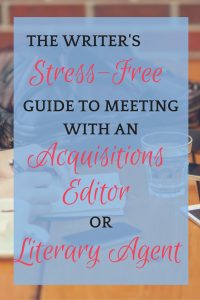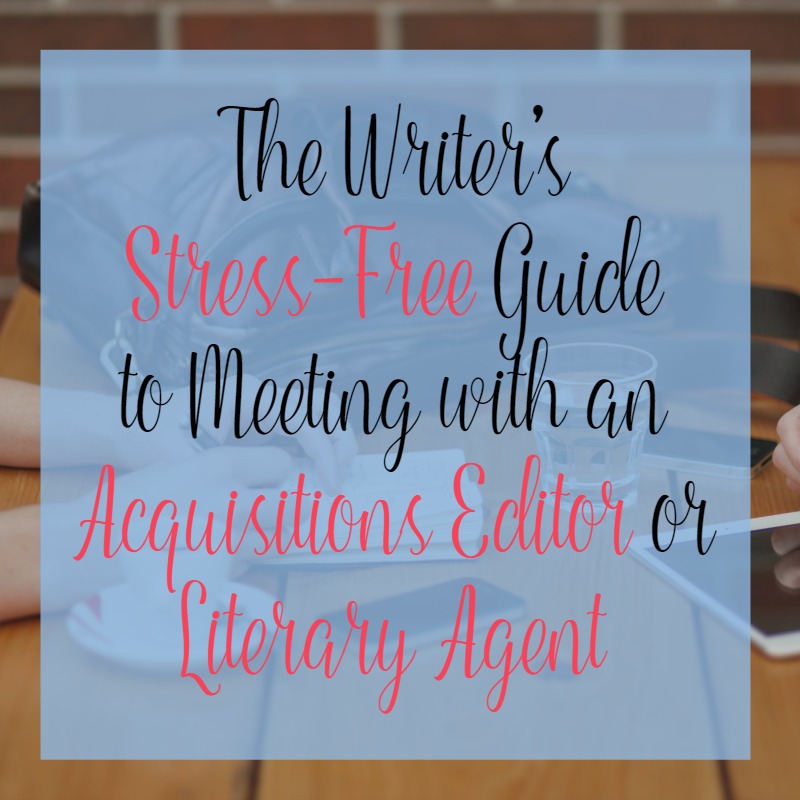 Editor’s Note: I’m very pleased to bring you this guest post from Chad R. Allen (@chadrallen), a writer, speaker, editor, and consultant. Author of Do Your Art: A Manifesto on Rejecting Apathy to Bring Your Best to the World, Chad blogs at www.chadrallen.com and serves as editorial director for Baker Books, where he has worked for over fourteen years. He lives with his wife and two young children in Grand Rapids, Michigan.
Editor’s Note: I’m very pleased to bring you this guest post from Chad R. Allen (@chadrallen), a writer, speaker, editor, and consultant. Author of Do Your Art: A Manifesto on Rejecting Apathy to Bring Your Best to the World, Chad blogs at www.chadrallen.com and serves as editorial director for Baker Books, where he has worked for over fourteen years. He lives with his wife and two young children in Grand Rapids, Michigan.
Meeting with an acquisitions editor or literary agent can feel like a mixed blessing. Getting to talk with a publishing pro about your work is obviously a great opportunity. But these meetings often come with severe time limitations, which can make the whole experience very stressful.
In this article I’d like to offer five things you can do to remove or reduce the stress of these meetings and maximize their value.
1. Set Reasonable Expectations
Wouldn’t it be great if when you sat down with an acquisitions editor, they greeted you warmly, shook your hand, and said something like, “We’ve read your proposal and think it’s perfect. Would you please sign this?” as they present you with a publishing contract? It would be awesome, but that’s not likely to happen. In fact, I would wonder about the editor or publisher if this did happen!
Regardless, if you go into this meeting with the expectation that it is going to lead you inexorably to publication, you’re likely to be disappointed.
So what is a reasonable expectation for such meetings? Well, you’re going to make a solid connection with a publishing insider. You’ll get to hear what this editor/agent thinks about your project. You’ll get some advice. And you’ll likely get to ask a question or two or more. Having expectations along these lines will yield a much more satisfying experience.
2. Do Your Homework and Prepare
Here are some steps to take so that you show up ready to engage:
- Learn what you can about this publisher or agency. Note which books they’ve already published that are similar to yours. Providing such books as reference points during the meeting demonstrates that you’ve done some homework, which is always a good thing. It also helps the editor or agent know how to think about your project—where it might fit in the marketplace and therefore what advice to offer you.
- Learn what you can about the editor or agent. Often editors or agents have blogs or Twitter accounts or have done interviews. Google them. Find out what you can so that you have a sense of who they are as people.
- Prepare a 60- to 90-second introduction to you and your project, but hold it loosely. Once you get into the meeting it may or may not make sense for you to share the whole intro. But if you have some talking points in mind, you’ll fumble less when the editor or agent asks you a relevant question.
- Come with two or three questions and put your top question at the top of the list. Getting focused on what you most want to know ahead of time will make for a more efficient use of time.
3. Get Some Rest the Night before and Be Fully Present during the Meeting
Don’t neglect something as simple as sleep! The more rested you are, the more natural it will be for you to engage, ask smart questions, and make a good first impression.
4. Remember, Kindness and Gratitude Go a Long Way
Editors and agents are people—real human beings with families and hopes and dreams of their own. We’re not just a means to your end. We have some expertise in the business and we’re willing to help you as much as we can, but your kindness and gratitude mean a lot to us. Keep these steps in mind:
- When you first meet the editor or agent, take your time to really greet him or her, ask how they’re doing. Let them know you’re grateful for the meeting and excited to talk to someone with expertise.
- If it feels like the editor or agent is happy to lead the meeting, let them do that. If not, you could ask, “Would it be helpful for me to offer a quick introduction to me and my project?” And then you can offer your 60- to 90-second intro.
- Come prepared to take some notes, but resist the temptation to write down every single thing the agent/editor says. If your nose is in your notepad the whole time, it will be that much harder to make a connection with the pro. Write down any resources or contacts they offer you as well as ideas you might forget if you didn’t write them down.
- Toward the end of the meeting, ask the editor or agent a question like “Would it be all right if I reached out to you with a follow-up question or two?” This will naturally lead to some avenue for further communication, which could be very useful down the line.
- At the end of the meeting, thank them for the meeting and share what you plan to do with the advice the pro offered you.
5. Take Stock and Follow Up
Sometimes we place so much emphasis on the meeting itself, we completely forget this step, which may be the most important. As soon after the meeting as possible, sit down and take 15 minutes or so to write down key points of the meeting and the most obvious action steps you should take.
Then, perhaps some time later, get these action steps into your calendar.
“What gets scheduled gets done,” says Michael Hyatt.
Finally, consider sending the editor or agent a thank you card. And I know this will sound self-serving, but it’s just true: a $5 gift card to Starbucks goes a long way toward helping that editor or agent remember you. Hey, we’re human!
A Free Action Guide
Thanks for taking the time to read this article. I hope it helps you make the best of your meetings with agents or acquisitions editors. If you’d like to go one step further, I’ve created an action guide specifically for Do A New Thing readers. To download your copy, simply click here and drop in your email. The guide is designed to help you think through the above steps as they relate to your particular project. It walks you through preparing for these meetings step by step so you’ll be ready to go, and then it helps you take stock and decide on your action steps after the meeting.
Christa’s Note: Thanks, Chad, for these great tips! We are all about reducing stress! Y’all, Chad is a super nice guy and not scary at all. He’s offered to stop by and answer any other questions you have about meeting with an acquisitions editor or literary agent. So ask away! (No Starbucks card required 😉 )
17 thoughts on “The Writer’s Stress-free Guide to Meeting with an Acquisitions Editor or Literary Agent”
Leave a Comment
Is your to-do list out of control?
Grab my best to-do list tips and learn to overcome the de-railers in your week


Two of the best people on the planet have come together to help take the nervousness out of publisher appointments. LOVE the solid advice in this post. Thanks, Chad and Christa.
Ha! You made it happen, Rachel!! Thanks for all you do, for your role in our lives, and for these kind words.
Y’all are both amazing and I am so blessed to receive your support and encouragement!
This is invaluable information. Thank you! I’ve had several meetings with agents at conferences. My pitch is almost always met with interest and enthusiasm, and I’m usually asked to submit. But I can’t seem to get past that point. It’s hard to stay encouraged.
Keep working it, Evelyn! God has a plan and something for you to learn from each one of those meetings 🙂
Evelyn, I hear you. That you are writing and pitching and, I presume, actively building a platform already sets you apart. As long as you feel called to this work, I encourage you to keep on keeping on. To quite would be to give up on your calling, and that would be a far worse disappointment than the ones you’ve faced up to this point. Consider innovating on what you’re doing, though. Mix it up. Self-publish something. Start a community. A lot of times the best way to combat a feeling of discouragement is getting together for coffee or lunch with an inspiring friend.
Thanks so much for your great advice here! Is it OK, to keep the lines of communication open with an Acquisitions Editor who took my book proposal to review after She Speaks last summer? The team’s answer was that I wasn’t marketable as a new author yet because of a small reach. I recently sent a follow up e-mail with some new platform statistics and received a kind response. Are there milestones I should be meeting before sending another e-mail? At what point do I start to look desperate?
Liz, great question. The temptation might be to think, “If I just keep reaching out to them, they’ll eventually give me a contract.” But I would be wary of this approach. Instead of focusing on how much or how often you can email them, focus instead on creating a material difference in what you have to offer–be that a larger platform, a different book concept, an agent’s advocacy, or something else. (In terms of a milestone, I always encourage writers to shoot for 10,000 email subscribers.) My point is to keep moving and growing and adapting and improving all you have to offer in a publishing partnership. That way, the next time you reach out to a publisher, you’re doing so with something significantly different (and better) to offer.
Thank you for your generous advice.
Such great content and comments in the follow-up. The whole process seems so daunting but Chad made it seem do-able. What great reminders that the people you meet are human and want to be respected for their jobs and roles as experts in the field. I appreciate that Chad also noted that they want to help you succeed and give valuable and sound advice. Loved the advice of keeping the meeting more realistic with using this experience as a learning adventure and not just as a sign-on-the-line approach. Thank you, Chad and Christa, for your work and encouragement. Have a great week!
Great advice, Chad! I feel like I’ve picked your brain at a dozen conferences by reading your blog over the years (it’s usaly a silent sort of brain picking ;)). Where should I send the Starbucks gift card to? ;).
Ha ha, that’s funny. No Starbucks card needed, but thanks for engaging with my content, Anita. I love serving folks like you!
I saw your post in a recent “Write His Answer” e-mail post. Wish you were coming to their conference. (Then I could have been applying all your advice to a meeting with you!) Thanks for the advice.
Sorry to miss you, Lael, but hopefully this article will be helpful in your meetings with other editors.